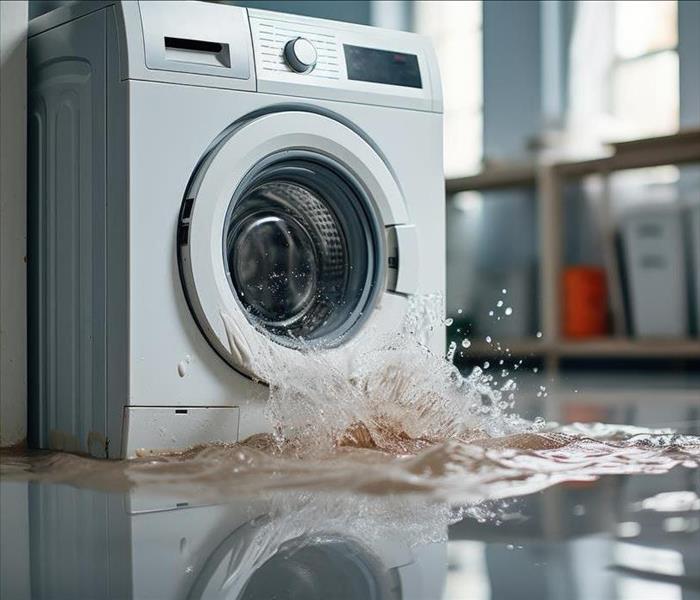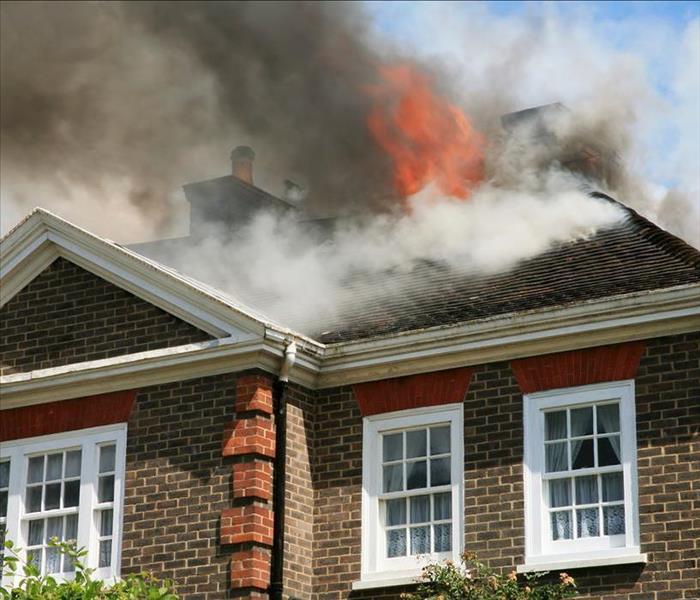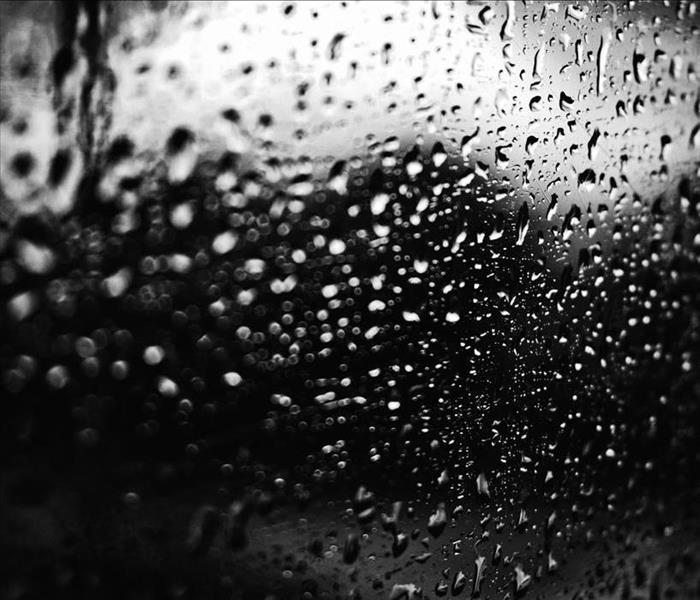Recent Posts
What to Do About Water Leaks | SERVPRO of Federal Way
3/22/2024 (Permalink)
 Home water leaks always happen when least expected. Call SERVPRO of Federal Way to restore your house today!
Home water leaks always happen when least expected. Call SERVPRO of Federal Way to restore your house today!
It’s all fun and games until you stumble upon a puddle on your basement floor or are hit with the musty odor of mold when heading into your attic for something. Water leaks are a common catalyst for home damage, but that doesn’t make them any less frustrating to deal with.
Tracking down the original source of the leak is the best way to take control of the situation and stop it at the source. But where do you start? Check out these common locations below and chances are that you will find the culprit quickly.
Going Hunting for Moisture
Our first suggestion is to start by looking around any exterior windows, doors or anywhere else that is directly connected to the elements. It could be as simple as an open window during a rainstorm or the fact that your front door just doesn't hang right anymore and there’s a gap in the door jamb.
Another common place to check are the pipes and water lines that are flowing through our home. Every sink, tub or faucet has some sort of water line that brings water into the space and another lane for bringing it right back out.
That means there are a lot of opportunities for water to leak around those pipes! A single loose connection or worn seal can spring a leak that leads to serious damage.
Checking Your Appliances
How many of you run at least one load of dishes every day? What about loads of laundry? Every time we turn on an appliance that relies on water to function, we are increasing the risk of suffering from a water disaster. After all, all it takes is a simple malfunction or electrical issue for water to start pouring out of the bottom or sides of our machines.
Check your appliances regularly while they are running to feel for moisture and look underneath them often for signs of dripping or leaking. If you do discover a leak caused by your appliance, stay calm and locate the water valve that is connected to the machine. Turn it off to stop the flow of water and then get us on the phone!
Calling SERVPRO® for Help
Water has the sneaky ability to get into all areas of your home in just a few minutes. Once it gets behind your walls, it will leak and seep into every crack and crevice that it can, which can make it really hard to dry out on your own!
That lingering moisture isn’t the only problem, either. The moisture can spark mold infestations and it can also degrade important structural components of your home. This is why a quick professional restoration is so important!
We will make sure to remove the lingering moisture quickly as well as address structural repairs for you. Our team is here to help you overcome water damage 24/7.
We can help you overcome water leaks. Call SERVPRO of Federal Way today!
Suffered a House Fire? We Have Your Back | SERVPRO of Federal Way
12/22/2023 (Permalink)
 When an unexpected disaster strikes, SERVPRO of Federal Way is Here to Help®. Call us to restore home fire damage today!
When an unexpected disaster strikes, SERVPRO of Federal Way is Here to Help®. Call us to restore home fire damage today!
House fires can be incredibly scary situations. They can erupt completely unexpectedly and create dangerous situations in mere minutes, giving your family only a short amount of time to escape.
While you are focusing on getting your family to safety and making contact with the local authorities, the fire can continue to rip through your home and cause extensive damage in every room and on every level. If this unfortunate scenario ever happens to you, SERVPRO® of Federal Way is here to assist you and help you recover.
The Initial Point of Contact
We know just how overwhelming fire situations are, so we get right to work from the first moment you call us. We will identify who the emergency contact will be, ask a lot of questions about the origin of the fire and start gathering the team and the supplies we will need to help you.
Once we arrive at your door, one of our project managers will do a visual assessment of the damage he or she sees and will adjust plans if necessary to align with the current situation.
Our main goal when we first arrive is to secure your home from further damage. House fires can expose parts of your home to the elements, so we will lay down tarps and remove certain possessions from rooms to minimize further damage while we work.
We will also get to work on removing water from your home! Did you know that many homes that suffer from fire damage also suffer from water damage? While hoses and water are essential to putting out fires, water can be just as damaging as fire.
Extracting the Water and the Repairs
We will use specialized equipment to remove excess water, and we will also focus on tracking down every inch of soot and smoke odor left behind. We will go from room to room during this process because smoke odors can travel to places that the fire never even touched.
Once these tasks are done, we can move on to cleaning and repairing your space! It is always our goal to restore rather than replace your possessions, so we work hard to restore documents, upholstery, furniture and carpets to the best of our ability.
Reconstructing Your Home
This is often the most exciting part for homeowners! You can finally see the reconstruction process come to life as your home is rebuilt from the ground up. We can tear down ruined spaces and start over or we can work around your home’s remaining structure to rebuild your home to your satisfaction.
In addition to our restoration services, we are also a full-service construction crew! That means we will be able to handle your entire reconstruction from start to finish with confidence and precision. Let us help you overcome a house fire faster.
Serious fire damage can occur even with small house fires. Call SERVPRO of Federal Way for quick fire damage restoration assistance.
Deep-Fried Turkey: Delicious Delight or Fiery Fiasco?
11/6/2023 (Permalink)
 Deep-frying a turkey carries a significant risk of fire, which can quickly turn a festive gathering into a nightmare.
Deep-frying a turkey carries a significant risk of fire, which can quickly turn a festive gathering into a nightmare.
Deep-frying a turkey has become an increasingly popular Thanksgiving tradition, and it's not hard to understand why. The result is a moist, flavorful bird with crispy skin that's absolutely mouthwatering. However, there's a dangerous side to this delicious endeavor. Deep-frying a turkey carries a significant risk of fire, which can quickly turn a festive gathering into a nightmare. In this blog, we'll explore the potential dangers of deep-frying a turkey and offer essential tips to ensure a safe and scrumptious holiday feast.
The Dangers of Deep-Frying a Turkey
Deep-frying a turkey can lead to a host of dangers, primarily fire-related. Here are a few of the main risks:
Oil Ignition: The most common cause of fires when deep-frying a turkey is the ignition of cooking oil. Turkey fryers typically use a large amount of oil, which, when heated to the required high temperatures, can become highly flammable. Even a small amount of spilled oil can ignite, leading to a fast-spreading fire.
Overfilled Pot: Overfilling the frying pot with oil is a recipe for disaster. When the turkey is lowered into the hot oil, it can displace the oil, causing it to overflow and potentially ignite, creating a hazardous situation.
Rapid Temperature Changes: Sudden changes in oil temperature can lead to violent boiling and splattering. If water or ice is introduced to a hot oil-filled turkey fryer, it can cause a significant flare-up or explosion.
Tips for Safe Deep-Frying:
Choose the Right Equipment:
- Invest in a turkey fryer specifically designed for the purpose. These units come with safety features such as a stable base and a thermometer.
Select the Right Location:
- Set up your turkey fryer outdoors on a flat, non-combustible surface, well away from structures, trees, and anything else that could catch fire. Never use a fryer in an enclosed space like a garage.
Measure the Oil:
- To avoid overfilling, determine the right amount of oil by placing the turkey in the pot and filling it with water until the turkey is submerged. Then, remove the turkey and mark the water level. Dry the pot thoroughly before adding the oil to the marked level.
Thaw the Turkey:
- Ensure that your turkey is completely thawed and dry before frying. Ice or moisture can cause oil splatters.
Slow and Steady:
- Lower the turkey into the hot oil slowly and cautiously to prevent oil from splattering. It's best to wear protective gear, such as gloves and eye protection.
Keep an Eye on the Temperature:
- Use a reliable thermometer to monitor the oil temperature. Maintain a steady temperature, and be prepared to adjust the heat source as needed.
Have Safety Equipment on Hand:
- Have a fire extinguisher nearby, and make sure you know how to use it. It's also a good idea to have a fire-resistant oven mitt and a lid to cover the pot in case of a small flare-up.
Deep-frying a turkey can be a delicious and satisfying way to celebrate Thanksgiving, but it's crucial to recognize and mitigate the potential risks. By following these safety guidelines and being vigilant, you can enjoy a succulent turkey without the risk of turning your holiday into a fiery fiasco. Safety should always be the main ingredient when it comes to deep-frying your Thanksgiving bird.
5 Ways to Prepare for House Fires: Your Family's Safety Matters
10/26/2023 (Permalink)
 Being prepared is essential for your safety and peace of mind.
Being prepared is essential for your safety and peace of mind.
House fires are devastating events that can occur suddenly and without warning, posing a significant risk to your family and property. While we all hope never to experience a house fire, being prepared is essential for your safety and peace of mind. In this blog, we'll discuss five crucial ways people can prepare for house fires and reduce the potential risks.
Install Smoke Alarms and Carbon Monoxide Detectors
Smoke alarms and carbon monoxide detectors are your first line of defense against house fires. These devices can detect smoke and poisonous gases, providing early warnings to occupants. Make sure to:
- Install smoke alarms on every level of your home, including inside and outside each sleeping area.
- Test your smoke alarms monthly to ensure they are in working order.
- Change the batteries in smoke alarms and carbon monoxide detectors at least once a year or as recommended by the manufacturer.
- Replace smoke alarms every 10 years and carbon monoxide detectors every 5-7 years.
By having functional smoke alarms and carbon monoxide detectors in place, you significantly increase your chances of escaping a fire unharmed.
Create a Fire Escape Plan
Having a well-thought-out fire escape plan is essential for ensuring your family's safety in the event of a house fire. Follow these steps to create an effective escape plan:
- Identify two exits from each room, such as doors and windows, and ensure they are easily accessible.
- Establish a central meeting point outside your home, a safe distance from the building.
- Practice your escape plan regularly with your family, so everyone knows what to do during a fire emergency.
- Assign responsibilities to family members, like who will assist younger children or pets during an evacuation.
Regularly rehearsing your fire escape plan helps build muscle memory, ensuring everyone can evacuate quickly and safely when needed.
Keep Fire Extinguishers on Hand
Fire extinguishers can be lifesavers in small, containable fires. Make sure you have the right type of fire extinguisher for your home, which is typically labeled as an ABC extinguisher. Follow these tips:
- Place fire extinguishers in areas where fires are more likely to start, such as the kitchen and garage.
- Ensure everyone in your household knows how to use a fire extinguisher properly. The PASS method (Pull, Aim, Squeeze, Sweep) is a good rule to follow.
Fire extinguishers can help you control small fires before they escalate, but safety should always be your top priority. If a fire is spreading rapidly or you're unsure about using an extinguisher, evacuate and call 911 immediately.
Safeguard Important Documents
House fires can result in the loss of valuable and irreplaceable documents, like passports, birth certificates, and financial records. To protect these items, consider the following:
- Store important documents in a fireproof and waterproof safe.
- Make digital copies of crucial documents and store them in a secure, cloud-based service.
- Share your digital document storage location and access with a trusted family member or friend.
Taking these steps will help you recover essential documents even if your physical copies are lost in a fire.
Minimize Fire Hazards
Prevention is a key aspect of fire preparedness. Take steps to minimize fire hazards in your home:
- Keep flammable materials and chemicals in a well-ventilated and secure area.
- Maintain your heating and electrical systems, and be vigilant for signs of wear or damage.
- Practice safe cooking habits, never leaving the kitchen unattended while cooking.
Regularly inspect your home for potential fire hazards, and address them promptly to reduce the risk of a fire breaking out.
Being prepared for a house fire is crucial for the safety of your family and the preservation of your property. By installing smoke alarms, creating a fire escape plan, keeping fire extinguishers on hand, safeguarding important documents, and minimizing fire hazards, you can significantly reduce the risk of a house fire and increase your chances of a safe evacuation in case of an emergency. Remember, safety should always be a top priority, and it's essential to stay informed about fire safety measures and any changes in guidelines from local fire authorities.
Weathering the Storm: 5 Ways Businesses Can Prepare for Storms in Seattle
10/26/2023 (Permalink)
 Seattle's notorious weather can be both beautiful and unpredictable.
Seattle's notorious weather can be both beautiful and unpredictable.
Seattle's notorious weather can be both beautiful and unpredictable. The city is known for its stunning landscapes, but it also experiences severe storms that can disrupt business operations. Whether it's heavy rainfall, high winds, or winter storms, Seattle businesses must be prepared to minimize disruptions and ensure the safety of employees and customers. In this blog, we'll explore five essential ways businesses can prepare for storms in Seattle.
Develop an Emergency Response Plan
Creating a comprehensive emergency response plan is the first and most crucial step in storm preparedness. This plan should include:
- Clear guidelines for how your business will respond to different types of storms.
- Designation of key personnel responsible for managing emergency response and communications.
- Evacuation and shelter-in-place procedures to ensure the safety of employees and customers.
- A plan for keeping employees informed about storm updates and closures.
Regularly review and update this plan to account for changes in your business, local emergency protocols, or new information about storm preparedness.
Invest in Backup Power and Communication Systems
Seattle storms can lead to power outages, making it essential for businesses to have backup power sources and communication systems. Consider these steps:
- Install backup generators to keep essential systems running during power outages.
- Maintain a reliable communication system, such as two-way radios, to ensure that employees can stay in contact during a storm.
- Develop a list of important contacts, including utility companies, local emergency services, and suppliers, to reach out in case of an emergency.
These measures will help your business maintain critical operations during power outages and ensure the safety of your employees and customers.
Secure Your Business Property
Storms can cause significant property damage. To minimize losses, take the following precautions:
- Regularly inspect your building's roof, walls, and windows for damage and address any issues promptly.
- Ensure that drainage systems are functioning correctly to prevent flooding.
- Consider installing storm shutters or reinforced doors and windows to protect against high winds and flying debris.
By securing your business property, you can reduce the risk of damage during a storm and expedite the recovery process.
Stock Emergency Supplies
Maintaining a stock of emergency supplies can be vital in the event of a severe storm. These supplies may include:
- Non-perishable food and drinking water to sustain employees and customers in case they are stranded.
- Basic first-aid kits and necessary medical supplies.
- Blankets, flashlights, and portable chargers for electronic devices.
Having these supplies on hand ensures that you can provide immediate assistance to those on your premises during a storm.
Stay Informed and Train Your Team
Knowledge is power when it comes to storm preparedness. Stay informed about local weather forecasts and potential storm warnings. Additionally, provide training for your employees on storm safety, emergency response procedures, and evacuation protocols. Regular drills and simulations can help your team respond effectively when a storm hits.
Seattle's unpredictable weather can pose a significant challenge to businesses. However, with careful planning and preparation, you can protect your employees, customers, and property from the impact of storms. Developing an emergency response plan, investing in backup power and communication systems, securing your business property, stocking emergency supplies, and staying informed and trained are essential steps in ensuring your business can weather the storm and emerge unscathed. Remember, safety and preparedness should always be top priorities for Seattle businesses facing the elements.
3 Essential Steps to Prepare Your Home for Cooler Weather and Prevent Water Damage
10/18/2023 (Permalink)
 Seattle isn't known for its snow, but it still happens here. Make sure your home is prepared, just in case.
Seattle isn't known for its snow, but it still happens here. Make sure your home is prepared, just in case.
As the temperature starts to drop and the leaves change color, homeowners need to prepare for the incoming cooler weather. One of the most significant threats to your home during this season is water damage. Rain, snow, and freezing temperatures can wreak havoc on your property if you're not adequately prepared. To help you safeguard your investment and maintain your home's integrity, here are three essential steps you should take to prevent water damage during the colder months.
1. Clean and Inspect Your Gutters and Downspouts
Your gutters and downspouts are your home's first line of defense against water damage. They are responsible for directing rainwater and melted snow away from your foundation and walls. However, if they are clogged with leaves, debris, or other obstructions, they won't be able to do their job effectively. Here's what you should do:
Clean Your Gutters: Remove leaves, twigs, and any other debris that may have accumulated in your gutters. This will ensure that water can flow freely through them.
Inspect for Damage: Check your gutters and downspouts for any signs of damage, such as rust or cracks. Replace any damaged sections to maintain their efficiency.
Consider Gutter Guards: Installing gutter guards can help prevent leaves and debris from clogging your gutters in the future.
By ensuring your gutters and downspouts are in good working condition, you can prevent water from overflowing and potentially seeping into your home's foundation or causing other forms of water damage.
2. Seal Any Cracks and Gaps in Your Home's Exterior
The smallest cracks and gaps in your home's exterior can become major entry points for water during cooler weather. Water infiltration can lead to structural damage, mold growth, and higher energy bills. To prevent these issues, follow these steps:
Inspect Your Home's Exterior: Carefully examine your home's exterior for cracks, gaps, or deteriorating caulk around windows, doors, and other openings.
Seal Cracks and Gaps: Use caulk or weatherstripping to seal any cracks or gaps you find. Pay special attention to areas where different building materials meet, as these are common trouble spots.
Consider Insulating Your Home: Proper insulation can not only prevent water infiltration but also help maintain a comfortable indoor temperature and reduce energy costs.
By proactively sealing any potential entry points for water, you can keep your home warm and dry during the colder months.
3. Winterize Your Plumbing System
Frozen pipes are a common problem during the winter, and they can lead to significant water damage if they burst. To prevent this, take the following steps to winterize your plumbing system:
Insulate Pipes: Insulate exposed pipes in unheated areas of your home, such as the attic or crawl spaces. Use pipe insulation or heat tape to keep them warm.
Drain Outdoor Faucets: Disconnect hoses and drain outdoor faucets to prevent water from freezing in the pipes.
Keep the Heat On: If you're leaving your home for an extended period during the winter, be sure to keep the heat on at a minimal temperature to prevent pipes from freezing.
By properly winterizing your plumbing system, you can avoid the costly and messy aftermath of burst pipes.
Preparing your home for cooler weather is crucial to prevent water damage and keep your property in excellent condition. By cleaning and inspecting your gutters, sealing cracks and gaps, and winterizing your plumbing system, you'll be well-equipped to face the challenges of the colder months. These simple steps can save you money, time, and a lot of headaches in the long run, ensuring your home remains a safe and comfortable haven throughout the winter season.
Navigating Fall: Identifying Potential Fire Hazards in Federal Way
9/29/2023 (Permalink)
 Heating appliances can pose a significant fire hazard if not maintained and used correctly.
Heating appliances can pose a significant fire hazard if not maintained and used correctly.
As the leaves in Federal Way start to turn vibrant shades of red and orange, and the air becomes crisp, fall's arrival brings about a unique charm to our community. However, it's also a season when the risk of fire hazards increases. The combination of fallen leaves, drying vegetation, and home heating can pose a threat if not managed carefully. Let's explore potential fire hazards that residents of Federal Way should be aware of during the fall season and provide tips on how to prevent them.
Accumulation of Dry Leaves:
While the sight of fallen leaves covering lawns and streets may be picturesque, it can also create a fire hazard. Dry leaves are highly flammable, and if they accumulate near your home or in your gutters, they can become a potential ignition source. To mitigate this risk:
- Regularly rake and dispose of fallen leaves.
- Keep gutters clear of leaves and debris.
- Store firewood, leaves, and other combustible materials away from the house.
Outdoor Fire Pits and Chimneys:
Fall evenings are perfect for cozy gatherings around fire pits and chimneys, but they can also be dangerous if not properly maintained. To enjoy these features safely:
- Have your chimney professionally inspected and cleaned before use.
- Use a spark screen to prevent embers from escaping.
- Keep a safe distance between the fire pit and any flammable structures or materials.
- Always have a fire extinguisher nearby and teach family members how to use it.
Heating Equipment:
As temperatures drop, many Federal Way residents will rely on heating equipment to stay warm. However, heating appliances can pose a significant fire hazard if not maintained and used correctly. To reduce the risk of fires:
- Have your furnace and heating systems serviced regularly.
- Keep space heaters at least three feet away from flammable materials.
- Ensure that your fireplace or wood-burning stove is in good working condition.
- Never leave heating appliances unattended.
Electrical Safety:
Fall often brings with it the need for additional lighting and electrical devices, especially with the holiday season approaching. To prevent electrical fires:
- Inspect holiday lights for frayed wires and replace damaged strings.
- Avoid overloading electrical outlets and extension cords.
- Consider using surge protectors to safeguard your electronic devices.
Fall in Federal Way is a beautiful season filled with vibrant colors and pleasant weather. However, it's crucial to be mindful of potential fire hazards that come with this time of year. By taking precautions, practicing fire safety, and staying vigilant, you can ensure a safe and enjoyable autumn season for you and your family. If you ever encounter a fire emergency, remember to contact your local fire department immediately for assistance. When the fire trucks leave, if you need help with fire damage mitigation, contact us right away.
Fire Safety Tips for Halloween
9/18/2023 (Permalink)
 Never leave lit candles unattended.
Never leave lit candles unattended.
When Halloween comes around, the idea of decorating is really exciting for so many people. Celebrating the spook-tacular fun of Halloween festivities is something that so many people look forward to every year. Many of us own full collections of decor for every part of the house - inside and out. But when it comes to decorating, it is important to make sure that you don’t mix up your indoor and outdoor decorations. Outdoor decor used indoors can cause fires (and so can indoor decor used outdoors). Here are some Halloween safety tips as Spooky Season comes into full swing.
- Use glow sticks or battery powered candles or lanterns to light up your jack-o’-lanterns. A flame is a fire hazard to anything nearby.
- If you choose to use a candle as part of your decor, never leave a lit candle unattended.
- Make sure all exits and escape routes are wide-open. It’s tempting to place decorations in doors and extryways, but in the event of a fire or other emergency, those decorations can block escape routes.
- Teach kids to stay away from any sources of open flames and make sure they know about Stop, Drop, and Roll.
In the event that your home or business needs fire damage mitigation or restoration services, do not hesitate to contact us. Read more from the National Fire Protection Association or the State Fire Marshal’s Office about even more excellent fire safety tips during this spook-tacular time of year.
5 Essential Fall Maintenance Tips to Prevent Water Damage in Your Federal Way Home
9/11/2023 (Permalink)
 Be ready for a beautiful autumn by keeping up with water damage prevention.
Be ready for a beautiful autumn by keeping up with water damage prevention.
Fall is a beautiful season in Federal Way, Washington, with colorful foliage and cooler temperatures. However, it also comes with the potential for heavy rainfall that can lead to water damage in your home. Preventing water damage requires proactive measures to protect your property. In this blog, we'll explore five crucial steps that Federal Way homeowners can take this fall to safeguard their homes from water damage.
1. Clean and Maintain Gutters and Downspouts
One of the most common causes of water damage in homes is clogged gutters and downspouts. Falling leaves and debris can block the flow of water, leading to overflow and potential water intrusion.
Action Plan:
- Regularly clean your gutters and downspouts, especially during the fall season.
- Ensure that downspouts direct water away from the foundation of your home, ideally at least 3-4 feet away.
2. Inspect and Repair Roof
Your roof is your first line of defense against water infiltration. Damaged or missing shingles can allow water to seep into your home, leading to costly repairs.
Action Plan:
- Inspect your roof for missing, damaged, or curled shingles.
- Replace or repair any damaged shingles promptly.
- Check for signs of leaks or water stains in your attic or ceiling.
3. Seal Windows and Doors
Gaps and cracks around windows and doors can allow rainwater to infiltrate your home. Proper sealing can prevent water damage and also improve energy efficiency.
Action Plan:
- Use weatherstripping or caulk to seal gaps around windows and doors.
- Check for damaged or deteriorating seals and replace them as needed.
- Ensure that windows and doors close tightly to prevent drafts and leaks.
4. Maintain Your Landscape
Landscaping plays a significant role in preventing water damage. Proper grading and drainage can direct water away from your home's foundation.
Action Plan:
- Inspect the grading around your home. Ensure that the ground slopes away from the foundation.
- Trim trees and bushes near your home to prevent them from overhanging your roof or blocking drainage pathways.
- Consider installing a French drain or other drainage solutions if you have persistent water issues.
5. Test Sump Pump and Check Basement
If your home has a sump pump, fall is an ideal time to ensure it's functioning correctly. A well-maintained sump pump can prevent basement flooding during heavy rains.
Action Plan:
- Test your sump pump by pouring water into the pit and ensuring it activates properly.
- Clean the sump pit of any debris.
- Inspect your basement for signs of moisture or leaks and address any issues promptly.
Preventing water damage in your Federal Way home this fall requires diligence and regular maintenance. By following these five essential steps, you can protect your home from the potentially devastating effects of water intrusion. Taking proactive measures now can save you both time and money in the long run while preserving the comfort and safety of your home. Don't wait; start your fall maintenance routine today to ensure a dry and secure home throughout the season
Hidden Mold In The Kitchen: Signs + Preventative measures
8/23/2023 (Permalink)
 Mold thrives in areas with lots of moisture.
Mold thrives in areas with lots of moisture.
Your kitchen is the heart of your home, a place where meals are prepared, memories are made, and conversations flow. However, beneath the surface of this bustling hub, a hidden intruder could be silently affecting your health and your kitchen's integrity. Mold, a type of fungus, has a knack for thriving in damp and dark environments. Here are 5 signs of hidden mold:
1. Musty Odors
The nose knows more than you might think. If you detect a persistent musty or earthy smell in your kitchen, it could be a telltale sign of hidden mold. Mold releases volatile organic compounds (VOCs) that contribute to these distinct odors. Don't simply mask the smell; investigate the source to prevent a mold infestation from spreading further.
2. Discoloration and Stains
Keep a watchful eye on your kitchen's surfaces, especially those prone to moisture exposure. If you notice unexplained discoloration, blotches, or stains on walls, ceilings, or even under your sink, it's time to delve deeper. Mold can appear in various colors, including black, green, or brown, and can often resemble dirt or grime.
3. Peeling or Bubbling Paint and Wallpaper
Mold's moisture-loving nature can cause paint and wallpaper to peel, crack, or bubble. If you notice these signs, it's essential to address the issue promptly. Ignoring it not only compromises your kitchen's aesthetics but also provides mold with an opportunity to thrive and spread.
4. Warped or Swollen Wood
Wooden surfaces in your kitchen, such as cabinets, countertops, and even flooring, are susceptible to mold growth if exposed to moisture. If you notice any warping, swelling, or distortion in these materials, it's a red flag. Mold's voracious appetite for organic matter makes wood an attractive target, and the longer the issue goes unaddressed, the more extensive the damage could become.
5. Excess Condensation and Humidity
Kitchens are prone to humidity and condensation due to activities like cooking and washing dishes. Excessive moisture provides an ideal breeding ground for mold. If you consistently notice condensation on windows, water droplets forming on walls, or damp spots in corners, it's time to consider that mold may be lurking nearby.
Prevention and Action
Prevention is key when it comes to hidden mold in your kitchen. Regularly inspect your kitchen for any of the signs mentioned above, and take steps to reduce moisture and humidity levels:
- Use exhaust fans or open windows when cooking or using the dishwasher.
- Repair leaks promptly to prevent water accumulation.
- Keep your kitchen well-ventilated to promote air circulation.
- Use a dehumidifier if needed, especially in areas prone to moisture.
- Clean and dry areas that are prone to dampness, such as under the sink and around the refrigerator.
Mold might be a silent intruder, but by staying proactive, you can prevent it from wreaking havoc in your kitchen. By recognizing the subtle signs and taking timely action, you'll not only protect your kitchen's structural integrity and aesthetic appeal but also ensure the health and safety of your loved ones. After all, a healthy kitchen is the cornerstone of a healthy home.
 Home water leaks always happen when least expected. Call SERVPRO of Federal Way to restore your house today!
Home water leaks always happen when least expected. Call SERVPRO of Federal Way to restore your house today!






 24/7 Emergency Service
24/7 Emergency Service








